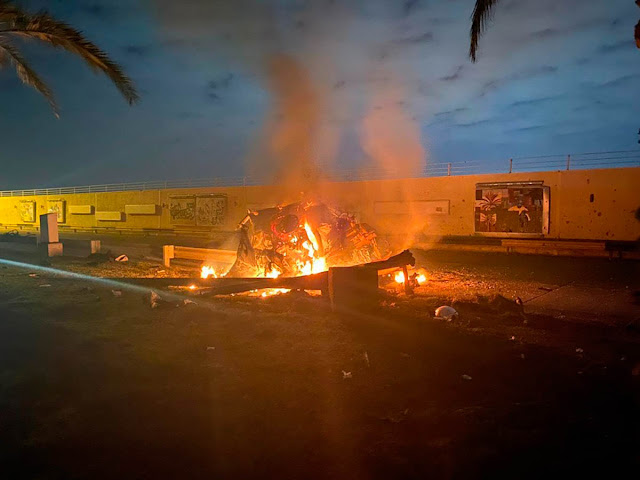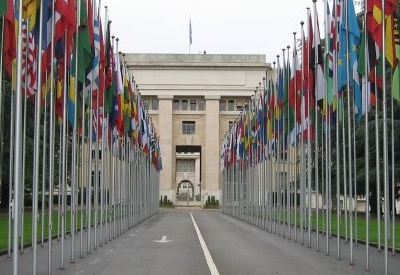Iran, Iraq, and the U.S. : The Art of the Triage
 |
| Bombing of Soleimani entourage at Iraq International Airport |
Sorting through the political rubble of Iraq... once again
In other words, and relating to tonight's (January 7-8) Iranian missile strikes inside Iraq, Iranian QUD forces have been operating inside Syria, Iraq, Lebanon etc. in a direct opposition to American, Israel, and Allied forces that have traditional interests in the region, but, have the common threat of Islamic State and other similar groups to counter. Therefore, leaders need to look beyond typical relationships, economic and military, to find a peaceful solution beyond immediate political benefits. If the situation in Iraq spirals out of control, Iraqi's stand to lose, yet, again, and smaller players like Jordan become more important in the peace brigade. In addition, if both sides can back away, they can both claim victory: America got their man in Soleimani - who may rival al Queda leader Ayman al-Zawahiri in importance, while Iran responded with considerable force to stand up to U.S. strength and appease the Iranian population.
Introduction
Mohammed Reza Pahlavi led a U.S. backed regime in Iran that sustained governance until 1979 when an uprising by Islamic leader, the Ayatollah Khomeini - exiled in France, had railed against The Shah's consolidation of power that ultimately led to a groundswell of support from the Arts community to counter Pahlavi's power surge. At this point, Khomeini had been tucked away in exile since 1963 for treasonous misgivings about The Shah's intentions for Iran, including the U.S. support for the administration and way of life, the zeitgeist of Islam, that was under threat by western values. Comparatively, one need not look further than Cuba for a similar tack when comparing the U.S. influence on an island nation-state, that Iran might be considered, at least, in their own minds in the 21st century. Therefore, political scientists can argue that the international community is no farther ahead since the demise of the Soviet Union than the fall of the Third Reich.
American Influence Opposite Authoritarian Regimes
There is a contestable strength of the U.S., backed by a weak collective security web of the U.N. and NATO opposed to a burgeoning China supported by big-brother Russia and the veto - power of a lame U.N. Security Council. America successfully circumvented the UN for the second invasion into Iraq over mythical weapons of mass destruction that never came to bear fruit, or mustard gas, as it were. Yet, UN sanctions continued to debilitate the Iraqi economy. It is anomalous or in the spirit of bi-lateral relations that different eras reflect opposing views that support an administrations desires at various points in time. This, no doubt is the weakness of democracies, that are constrained by electoral term limits. Currently, China's President Xi Jinping is emboldened by unlimited term limits to do, carte blanche, what the CPC sees as a means to pushing the United States into a restrained role on the global stage, both militarily and economically. After all, who wants to finish in second place in the sport of organized politics where Olympics or major league sports present themselves as pieces on the chessboard that China manipulates so well presently, NBA basketball for one recent example. Naturally, when your stadium can hold capacity crowds, local and senior officials can call the shots.Notwithstanding , secular China has been reported to having "over one million marathon runners in China in 2016" a prolific cottage industry unto itself.2
So, what does this do or how do situations empower citizens against the spoils of these two Goliath's from creating unnecessary cannon fodder of their citizens. One can advise those to join the civil service, Diaspora, or join opposing forces. In this period of globalization with softer borders before the current wave of populism, movement was a much simpler gambit, save for a few authoritarian regimes such as North Korea. Iran fits this mould as it seeks to maintain a loyal Shiite Muslim following to support the late Khomeini legacy. Israel, surrounded by those nation - states that would like to see it annihilated is constantly under siege and supported by western allies, at least in spirit and with the U.S. providing financial support for the Israeli Raphael Iron Dome missile defence shield. This is the era of supra - proxy warfare in the eastern hemisphere as the Near East led by U.S. and Israel versus Syria and Iran, continues unabated. China can fly under the radar momentarily as it has created an arms race in the Pacific region.
So, what does this do or how do situations empower citizens against the spoils of these two Goliath's from creating unnecessary cannon fodder of their citizens. One can advise those to join the civil service, Diaspora, or join opposing forces. In this period of globalization with softer borders before the current wave of populism, movement was a much simpler gambit, save for a few authoritarian regimes such as North Korea. Iran fits this mould as it seeks to maintain a loyal Shiite Muslim following to support the late Khomeini legacy. Israel, surrounded by those nation - states that would like to see it annihilated is constantly under siege and supported by western allies, at least in spirit and with the U.S. providing financial support for the Israeli Raphael Iron Dome missile defence shield. This is the era of supra - proxy warfare in the eastern hemisphere as the Near East led by U.S. and Israel versus Syria and Iran, continues unabated. China can fly under the radar momentarily as it has created an arms race in the Pacific region.
For Iran, that has colonial ambitions of their own, or, at least the spread of their orbit, the U.S. bombing in Iraq of their number two strongman, Qasem Soleimani has heightened the potential of conflict between Iran and the U.S. despite the attack taking place inside Iraq. For this we might say that regional politics or globalization has led to a blurring of intentions to the casual observer. Make no mistake, though, political interests are playing a huge role in the Near East in terms not likely seen since the Turkish War of Independence that resulted in the partitioning of the Ottoman Empire (1919-1923.) That Iran and Iraq fought a bloody war from 1980 - 1988, resulting in a UN brokered ceasefire that stands today, with over 500,000 combined forces and civilians having died in the conflict is symbolic of an Iraq that mistrusts America and its Allies beyond the memory of the eight year conflict against Iran.
America, turfed out of Iran after the 1979 revolution found a new dance partner in Iraq under the leadership of Saddam Hussein. Post Iran - Iraq, the U.S. opposed an overconfident Hussein who directed his Amy into Kuwait to lay claim to energy deposits and ultimately set ablaze oil wells following America's invasion of Iraq to liberate Kuwait and the oppressed Iraqi population. The U.S. continued along this path with No Fly Zones mandated by the US, UK, and France to protect the Kurds in the north and the Shiite Muslim population in the south. The Bush Administration found an easy post 911 target in Iraq and forced Saddam into hiding that led to his surrender, and trial for the Halabja Massacre against the Kurds on March 16, 1988. Hussein was found guilty by an Iraqi court and executed in 2006. The absence of an official strongman in Iraq had plunged the country into internal conflict and near civil war. Political and spiritual divisions ensued between traditional governing Sunni's and Shiites demanding a stronger presence in a unicameral Iraqi Parliament.
Iraq Caught In a Political Vortex
The rise of Islamic State in Iraq offered a cleavage for Iran to extend its reach west of Baghdad. Now, as it has found a vehicle in Hezbollah to operate in Iraq and Syria, Damascus and Sana'a (Yemen) employing elite Revolutionary Guards (QUDs Force) to influence those regions putting American interests and local officials and citizens under pressure, once again.3
That Soleimani had been plotting against American interests in the region and was implicated in the attack on the American Embassy in Iraq was enough reason for Trump to approve of Soleimani's killing. The aftermath will surely bring a strong Iranian response that may pull America into a protracted conflict just in time for the Fall election. Trump had no choice here and it goes without saying that he orchestrated the whole Iranian nuclear imbroglio by walking away from the brokered Obama led agreement. The undercurrent of Iranian plotting against American interests and the death of an American contractor spurred the U.S. to act to maintain its international image as a tour de force in international relations. Trump stated that the U.S. does not want a war with Iran and can point to his decision to cancel a military strike in June 2019 for Iran shooting down a U.S. drone. This inaction by the President, some agree, gave Iran the confidence to bomb Saudi Arabian oil fields in September. If Trump tries to recover lost ground through air strikes against Iran with retaliation by Iranian forces, resulting in American casualties exceeding acceptable limits, Trump's approval ratings will diminish in a war weary America. Democratic fortunes may succeed by ushering in new prophets and prophecies in 2021.
Conclusion
A re-drawing of the Near East may be upon us bolstering Assad in Syria, Ali Khamenei in Iran, Erdogan in Turkey, while pitting Sunni dominance in Egypt, Saudi Arabia, Syria and Turkey against Shiite preeminence in Iran and Iraq. Those seeking democratisation best prepare their compass for Morocco, Tunisia, Turkey, Lebanon, Israel, Jordan and Kuwait, according to Freedom House. Saddam, the clever tyrant, had a tight hold over the region. Sometimes, in the pursuit of righteousness, best to leave well enough alone.
Works Cited
1 Kieswetter, Kevin. "Iran, Iraq, and the U.S. Triage : Apostates & Patriots. " <https://kevinkieswetter.blogspot.com/2020/01/iran-iraq-and-us-saints-and-sinners.html>.04.01. 2020.
2 Klingelhofer, Claudia. "These are the most popular sports in China." ISPO.com. 07.06.2017. 04.01.2020. <https://www.ispo.com/en/markets/id_79708806/these-are-the-most-popular-sports-in-china.html>.
3 Daoud, David. "Meet the Proxies: How Iran Spreads Its Empire through Terrorist Militias." The Tower Magazine. Issue 24, March 2015. 4 January 2020. <http://www.thetower.org/article/meet-the-proxies-how-iran-spreads-its-empire-through-terrorist-militias/>.




